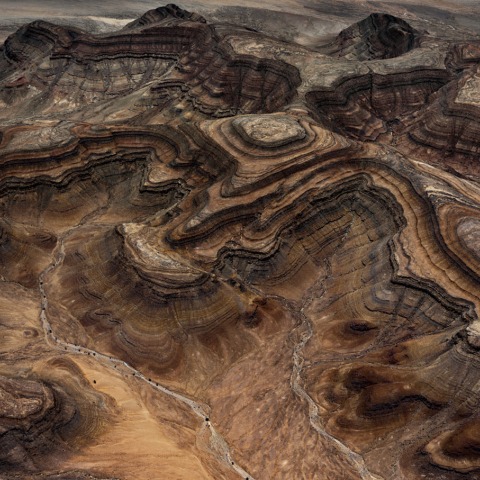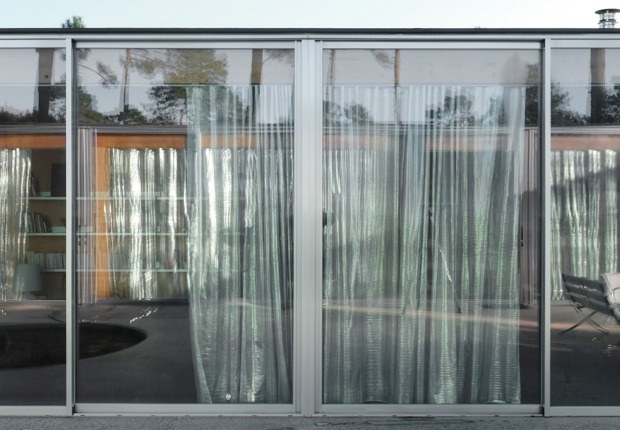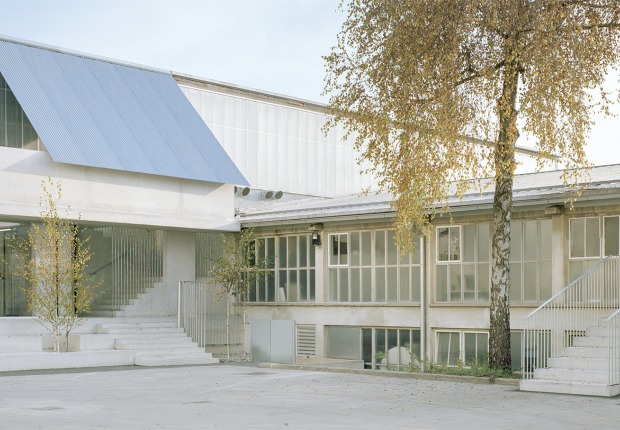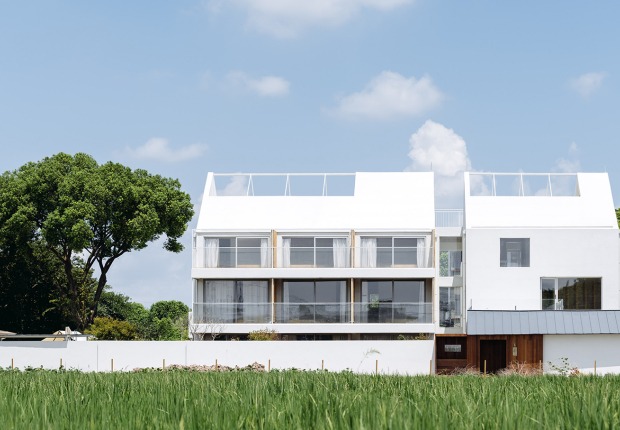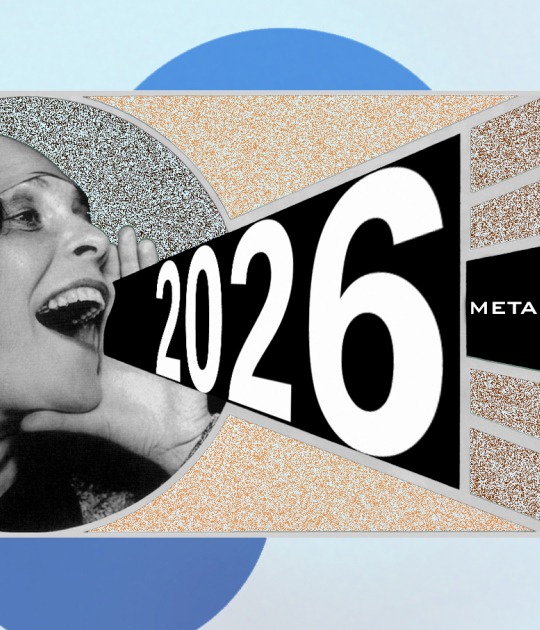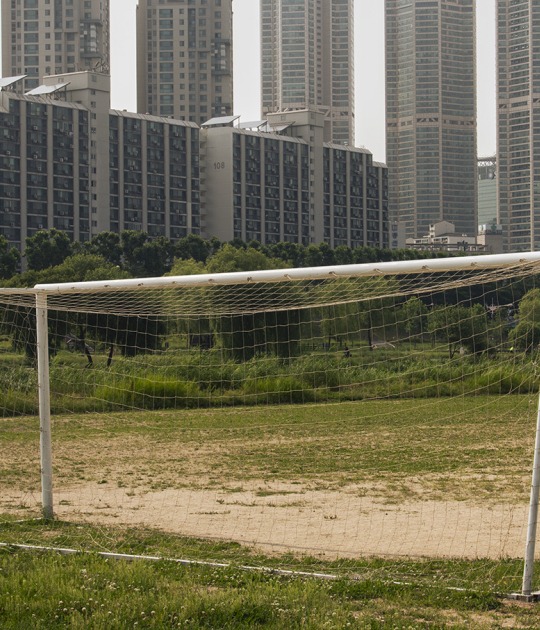The images by Edward Burtynsky present environments shaped by various resource extraction processes, from the artisanal sapphire mines of Madagascar and the salt flats of Senegal to the "residual landscapes" of mechanized industrial extraction. Along with industrialized landscapes, the artist also offers images of the pristine natural environment as a reminder of its fragility and finiteness, such as the rich sculptural topography of the Tsaus Mountains in Namibia; or the unaltered ecosystem of Lake Logipi, in the Rift Valley (Kenya).
With this project, the author seeks to make society aware of the high cost of the growth of our civilization without taking sustainable practices into account and of the need to launch government initiatives organized on a global scale, to protect present generations and the future of what is about to be lost forever.
Burtynsky's works, mostly photographed from aerial perspectives, often show a flattened frontal aspect that transforms the image into superbly graded fields of color or forceful grid-like compositions reminiscent of modernist abstraction. Presented on a large scale and with an irresistible level of detail, his pictorial surfaces and gestural features allow a glimpse of the confluence of natural designs and human infrastructures. Burtynsky's perpetual search for abstraction in landscape strikes a delicate balance between form and content. He describes this dualistic approach as "holding two doors open" for the viewer to enter the work, investigating a very broad subject while, at the same time, exploring the image as a form of intuitive sensory expression.
African Studies is available in book form, published by Steidl in the fall of 2022.

GERD, by Edward Butynsky. Benishangul-Gumuz Region, Ethiopia, 2019. Photograph by Edward Butynsky. Courtesy of Nicholas Metivier Gallery, Toronto / Flowers Gallery, London.
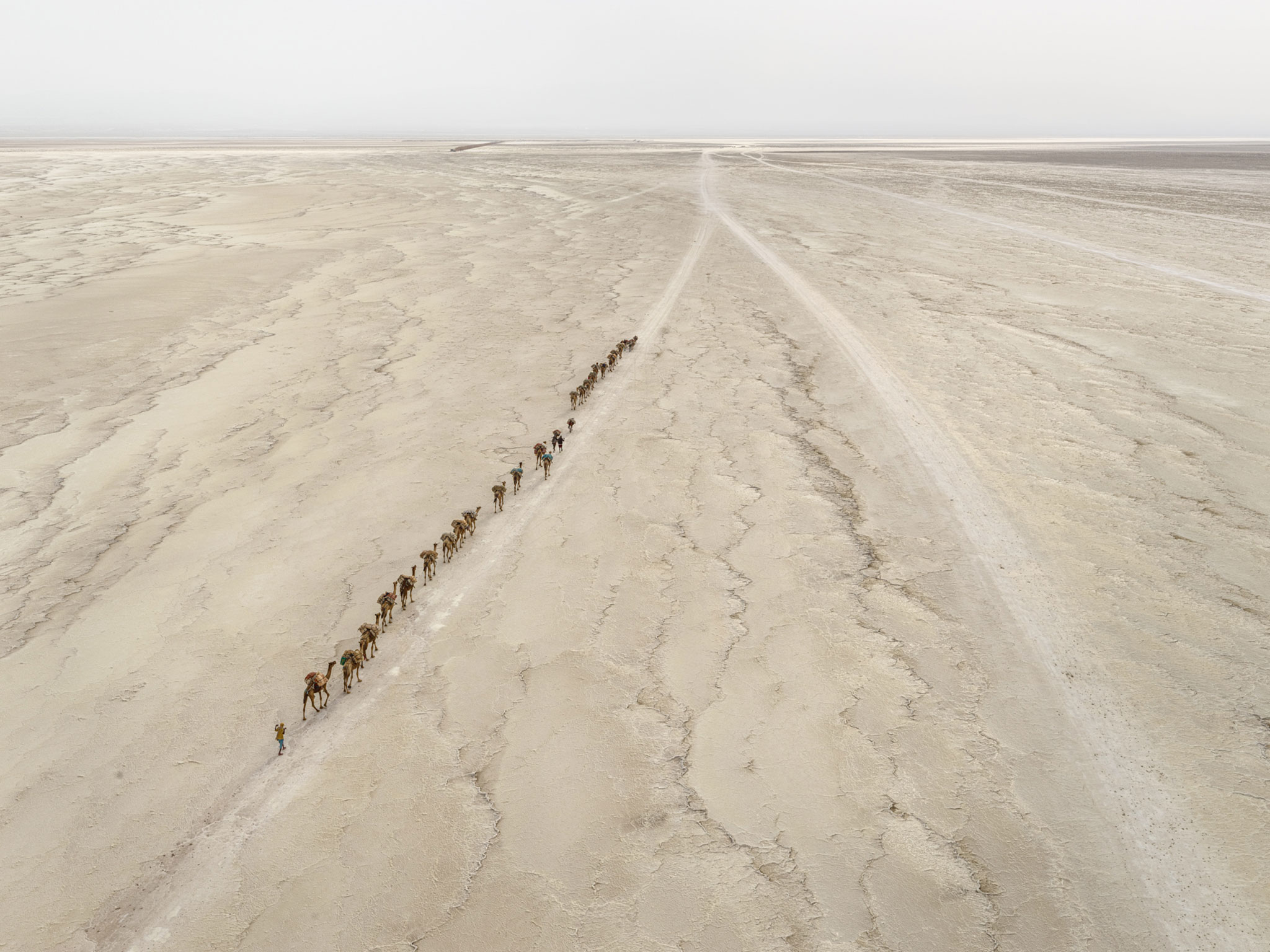
Camel Caravan, by Edward Butynsky. Danakil Depression, Ethiopia, 2018. Photograph by Edward Butynsky. Courtesy of Nicholas Metivier Gallery, Toronto / Flowers Gallery, London.
Edward Burtynsky is considered one of the world's foremost contemporary photographers. His extraordinary photographic representations of global industrial landscapes represent more than 40 years of his dedication to testifying to the impact of humans on the planet. Burtynsky's photographs are in the collections of more than 80 museums around the world, including the National Gallery of Canada in Ottawa; Museum of Modern Art, Metropolitan Museum of Art and Guggenheim Museum in New York; Tate Modern in London, the Los Angeles County Museum of Art in California or the Museo Nacional Centro de Arte Reina Sofía.
Burtynsky's honors include the inaugural TED Prize in 2005, which he shared with Bono and Robert Fischell; the Governor General's Awards in Visual Arts and Media; the Outreach Award at the Rencontres d'Arles; the Roloff Beny Book Award; and the 2018 Photo London Master of Photography Award. In 2019 he received the Arts & Letters Award at the Canadian Association of New York's annual Maple Leaf Ball and the 2019 Lucie Award for Achievement in Documentary Photography. In 2020 he was awarded the Royal Photographic Society Honorary Scholarship and in 2022 he received the World Photography Organization's Outstanding Contribution to Photography Award. He has recently been inducted into the International Photography Hall of Fame and in 2022 he has received the Pollution Probe Award.
Burtynsky was also a key figure in the production of the award-winning documentary trilogy Manufactured Landscapes (directed by Jennifer Baichwal, 2006), Watermark (directed by Baichwal and Burtynsky, 2013), and ANTHROPOCENE: The Human Epoch (directed by Baichwal, Nicholas de Pencier, and Burtynsky, 2018). All three films continue to screen at festivals around the world. Burtynsky is currently the holder of eight honorary doctorates.
With this project, the author seeks to make society aware of the high cost of the growth of our civilization without taking sustainable practices into account and of the need to launch government initiatives organized on a global scale, to protect present generations and the future of what is about to be lost forever.
Burtynsky's works, mostly photographed from aerial perspectives, often show a flattened frontal aspect that transforms the image into superbly graded fields of color or forceful grid-like compositions reminiscent of modernist abstraction. Presented on a large scale and with an irresistible level of detail, his pictorial surfaces and gestural features allow a glimpse of the confluence of natural designs and human infrastructures. Burtynsky's perpetual search for abstraction in landscape strikes a delicate balance between form and content. He describes this dualistic approach as "holding two doors open" for the viewer to enter the work, investigating a very broad subject while, at the same time, exploring the image as a form of intuitive sensory expression.
African Studies is available in book form, published by Steidl in the fall of 2022.

GERD, by Edward Butynsky. Benishangul-Gumuz Region, Ethiopia, 2019. Photograph by Edward Butynsky. Courtesy of Nicholas Metivier Gallery, Toronto / Flowers Gallery, London.

Camel Caravan, by Edward Butynsky. Danakil Depression, Ethiopia, 2018. Photograph by Edward Butynsky. Courtesy of Nicholas Metivier Gallery, Toronto / Flowers Gallery, London.
Edward Burtynsky is considered one of the world's foremost contemporary photographers. His extraordinary photographic representations of global industrial landscapes represent more than 40 years of his dedication to testifying to the impact of humans on the planet. Burtynsky's photographs are in the collections of more than 80 museums around the world, including the National Gallery of Canada in Ottawa; Museum of Modern Art, Metropolitan Museum of Art and Guggenheim Museum in New York; Tate Modern in London, the Los Angeles County Museum of Art in California or the Museo Nacional Centro de Arte Reina Sofía.
Burtynsky's honors include the inaugural TED Prize in 2005, which he shared with Bono and Robert Fischell; the Governor General's Awards in Visual Arts and Media; the Outreach Award at the Rencontres d'Arles; the Roloff Beny Book Award; and the 2018 Photo London Master of Photography Award. In 2019 he received the Arts & Letters Award at the Canadian Association of New York's annual Maple Leaf Ball and the 2019 Lucie Award for Achievement in Documentary Photography. In 2020 he was awarded the Royal Photographic Society Honorary Scholarship and in 2022 he received the World Photography Organization's Outstanding Contribution to Photography Award. He has recently been inducted into the International Photography Hall of Fame and in 2022 he has received the Pollution Probe Award.
Burtynsky was also a key figure in the production of the award-winning documentary trilogy Manufactured Landscapes (directed by Jennifer Baichwal, 2006), Watermark (directed by Baichwal and Burtynsky, 2013), and ANTHROPOCENE: The Human Epoch (directed by Baichwal, Nicholas de Pencier, and Burtynsky, 2018). All three films continue to screen at festivals around the world. Burtynsky is currently the holder of eight honorary doctorates.
